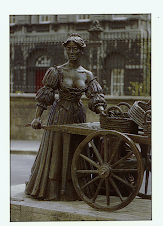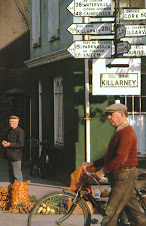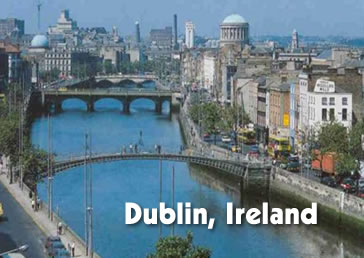Saturday 22 November 2008

Halloween's day
Halloween (All Saints’ Day Eve) is a nighttime holiday in the USA, the night in the year when children’s world turns to pure fantasy. Children (from 3 to about 11 years old) start preparing their clothes and Halloween decorations week ahead. Although parents are much involved in the preparation, on Halloween they must pretend to be frightened by the masked faces that suddenly appear. There will be little witches in long black dresses with tall pointed hats and magic brooms. There is occasional adult Halloween Dance, but Halloween in the USA has become essentially a young people’s holiday.
Halloween’s origins date back to hundreds of years before Christ to the Druid festival of Samhaim, Lord of the Dead and Prince of Darkness. According to Celtic belief, Samhaim Heaven on October 31. the Sun God, who shared the holiday, received thanks for the years’s harvest.
The jack-o’-lantern, a lantern made from a hollowed pumpkin with a carved face, is the most typical of Halloween symbols. It has its origin in Ireland where it was made from a large hollowed potato or turnip. ‘Trick or treat’ likewise had its origin in Ireland, where children used to go from house to house begging food for the village Halloween festivities.
In the USA ‘trick pr treat’ and Halloween are synonyms for children. They dress up in fancy dresses and go around the neighborhood ringing doorbells. As the door opens they shout, ‘trick or treat’, and they usually get candies, cookies, and fruit. When they don’t get these things, they may play a trick on the owners of the house. These tricks are not more serious than soaped windows or some misplaced garden tools.
Halloween Poems
Five Little Pumpkin Sitting On A Gate
Five little pumpkins sitting on a gate,
The first one said,
"Oh my, it's getting late.
"The second one said,
"But we don't care.
"The third one said,
"I see witches in the air.
"The fourth one said,
"Let's run, and run, and run.
"The fifth one said,
"Get ready for some fun.
"Then whoosh went the wind,
and out went the lights,
And five little pumpkins rolled out of sight!
Haunted House
by Jack Prelutsky
There's a house upon the hilltop
We will not go inside
For that is where the witches live,
Where ghosts and goblins hide.
Tonight they have their party,
All the lights are burning bright,
But oh we will not go inside
The haunted house tonight.
The demons there are whirling
And the spirits swirl about.
They sing their songs to Halloween.
"Come join the fun," they shout.
But we do not want to go there
So we run with all our might
And oh we will not go inside
The haunted house tonight.
Monday 5 May 2008
Do and make
The teacher el 22/04/07
DO AWAY WITH: abolish. Ex. Slavery was not done away with until the nineteenthcentury.
DO OUT OF: prevent from having. Ex. He did me out of my rightful inheritance.
MAKE FOR: move in the direction of. Ex. Let´s make for the city centre and find a restauranton the way.
MAKE OF: think (opinion). Ex. What do you make of him?
MAKE OFF: leave hurriedly. Ex. He made off as soon as he heard their car turninto the drive.
MAKE UP FOR: compensate for. Ex. The superb food at the hotel made up for the uncom-fortable rooms.
MAKE UP TO: be nice to in order to. Ex. He made up to her until she agreed to help.
from Aprender Inglés Gratis - Cursos gratutitos
Friday 2 May 2008
Monday 28 April 2008
Friday 25 April 2008
FALSE FRIENDS
Lista de False Friends
Se conoce como False Friends a aquellas palabras que en inglés recuerdan a una forma similar española y, sin embargo, el significado es completamente diferente. Conviene conocer este tipo de palabras para no caer en ningún error de interpretación.
A continuación ofrecemos una lista con los más conocidos False Friends y su correcta definición.
|
| Aprobar una idea, proyecto, acción etc (no aprobar un examen) |
| CAREER | -Carrera profesional (vida de trabajo) (no carrera universitaria) |
| COMPROMISE - | Comprometer algo o una situación |
| EMBARRASSED - | Apenado/a |
| EVENTUALLY | Finalmente, a la larga o en algún momento dado |
| FOR | Para |
| LECTURE - | Platicar o una plática sobre un tema en lo particular |
| PARENTS - | Padre y madre (no más parientes) |
| REALIZE | Darse cuenta, entender de pronto o caer en cuenta. |
| SCIENTIFIC) | Hecho científico (no la persona, el científico |
| ACTUALLY | En realidad o realmente |
| | |
| | |
| | |
Thursday 24 April 2008
PHRASAL VERBS
Los llamados phrasal verbs son verbos que se forman juntando el verbo y una preposición, tomando un nuevo significado el verbo original.
Estos verbos son muy empleados en inglés y resulta imprescindible conocerlos para mantener una conversación en el extranjero.
A continuación te mostramos un listado con los phrasal verbs más usados.
| AGREE WITH | estar de acuerdo |
| BE ABOUT TO | estar a punto de |
| BE BACK | regresar |
| BE OUT OF | quedarse sin |
| BE OVER | terminarse |
| BREAK DOWN | averiarse |
| CALL BACK | volver a llamar |
| CARRY ON | seguir. continuar |
| CARRY OUT | llevar a cabo |
| CLEAR UP | poner en orden |
| COME ACROSS | encontrar, dar con |
| COME IN | entrar |
| CUT OFF | cortar, desconectar |
| GET BACK | volver, regresar |
| GET IN(TO) | entrar |
| GET OFF | bajar (de un autobús, tren) |
| GET ON | subir (a un autobús, tren, moto) |
| GET UP | levantarse |
| GIVE BACK | devolver |
| GIVE UP | dejar (de fumar, beber) |
| GO AWAY | irse, marcharse |
| GO BACK | volver, regresar |
| GO OUT | salir (por la calle) |
| HANG ON/HOLD ON | esperar |
| HANG UP | colgar (el teléfono) |
| KNOCK DOWN | derribar, atropellar, demoler |
| LOOK AFTER | cuidar |
| LOOK FOR | buscar |
| LOOK FORWARD TO | esperar con ilusión |
| LOOK UP | buscar algo (en un libro, diccionario) |
| PUT IN | meter, introducir |
| PUT ON | encender |
| RUN OUT OF | quedarse sin algo |
| TAKE AFTER | parecerse a |
| TAKE OFF | despegar |
| TAKE OUT | extraer, sacar |
| THROW AWAY | tirar (en la basura) |
| TURN DOWN | bajar (el volumen) |
| TURN UP | subir (el volumen) |
| TURN ON | encender (televisión, luces etc.) |








